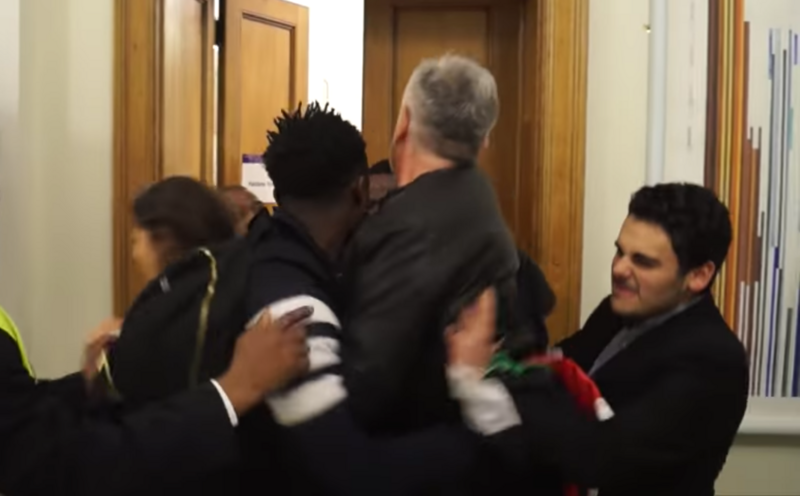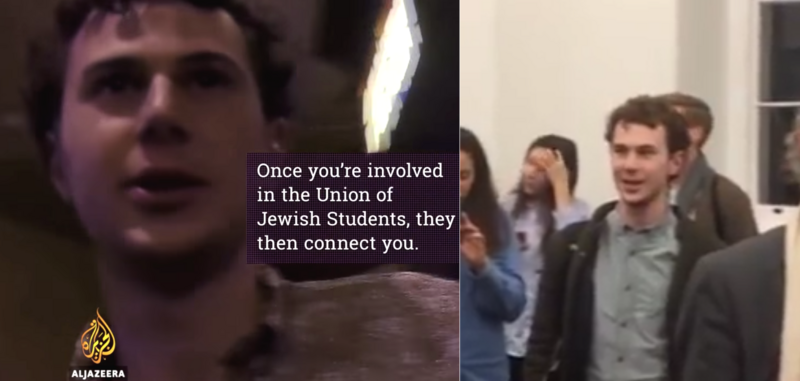Lobby Watch 21 March 2017

“It’s a violent religion” — video still shows former Israeli foreign ministry fellow Elliot Miller abusing student protesters he perceived as Muslim.
An Israeli soldier’s controversial appearance at University College London (UCL) involved provocations by groups funded from Israel, a journalist for Israeli state media is alleging.
Jerry Lewis, an Israel Radio correspondent for 36 years, said in January that the October incident was an example of pro-Israel “infiltrators” coming onto campuses and endangering Jewish students in the UK.
Lewis said the infiltrators were “interfering” in student affairs and provoking unrest “to make sure they can justify the funding they get from Israel.”
Despite this, UCL’s management is moving to discipline five students involved in protests against soldier Hen Mazzig last October.
UCL’s Friends of Israel society had organized the meeting with Mazzig, who at the time described himself as an Israeli army reservist.
A recent UCL investigation into the incident found that the student union had initially declined Mazzig the required permission, due to procedural errors in the society’s booking.
The society failed to disclose information on Mazzig, claiming there would be no media interest and that no room security would be needed.
Against union rules, the group began advertising Mazzig’s talk before a decision had been reached. As a result, the report says, the society breached student union regulations.
But after an appeal to university management, lodged on “advice from the UK Lawyers for Israel,” UCL’s vice provost overruled the union’s initial decision.
Student protesters with Palestinian flags then disrupted the event on the night. Police were called, but there were no arrests.
Flawed investigation
According to a post on a prominent pro-Israel blog, “twenty or so [pro-Israel] veterans” came to the supposedly student society event.
Video evidence shows that these “veterans” abused student protesters as “vermin” and “scum.” Another one declared his wish for Palestine to be free “from Arabs.” One told a student protester – a person of color – to “get out of our country.”
Yet instead of taking action against such abuse, UCL officials fueled headlines about “violent” protesters by emphasizing that they did not “condone acts of intimidation or violence under any circumstances.”
The investigation’s report, published in January, found that although there had been “a hostile and tense atmosphere, with verbal hostility and flag waving” from both protesters and pro-Israel activists, there had been “no physical violence or damage to property.”
The report says that despite the protests, the event went ahead but “in a highly disruptive and intimidatory atmosphere and in an abbreviated form.”
Five student protesters have now been referred to a disciplinary panel, a move which could lead to expulsion or other harm to their futures.
Video evidence
The report claims that the investigation found no evidence that any pro-Israel individuals “had attended the protest in an attempt to disrupt and/or inflame the protesters.”
Asked by The Electronic Intifada why Jerry Lewis’ comments about pro-Israel “infiltrators” had been omitted from his report, Professor Geraint Rees, who conducted the investigation, would only repeat – despite the mountain of video evidence – that he had been “unable to identify any pro-Israel individuals from outside UCL who had attended the protest.”
Rees then declined to answer further questions. A university press officer did not reply when asked why Lewis’ allegations had not been included in the report.
But copious video evidence clearly shows the presence of members of outside pro-Israel groups, including several videos filmed by such groups. These were the anti-Palestinian “veterans” who abused students in racist terms.
The videos corroborate Lewis’ January allegation that Israel-funded “infiltrators” were there.
Lewis is a former vice president of the Board of Deputies of British Jews – the same pro-Israel group that led a furious backlash against the student protesters.
Pressure on UCL
The day after the protest, Board of Deputies president Jonathan Arkush spoke to UCL provost Michael Arthur to express “the community’s profound anger at the anti-Israel protest.”
According to the Board of Deputies, Arkush demanded a statement condemning the protest and an “assurance that protesters identified as members of UCL will face disciplinary action once the evidence has been reviewed.”
The Board said that UCL’s provost “immediately agreed” to all its demands.
In an email to The Electronic Intifada, a UCL spokesperson denied that there had been a rush to judgment, and contested the Board of Deputies statement. The spokesperson said the provost had actually said that “if the investigation showed that any student protesters from UCL had contravened the student code of conduct” they could be disciplined.
A Board of Deputies spokesperson backpedaled on the group’s original statement, writing to The Electronic Intifada that “the phrase ‘once the evidence has been reviewed’ implies that only those protesters guilty of intimidation would be disciplined.”
But the original statement said nothing about “intimidation,” only criticizing “protesters” for being “anti-Israel.”
Emails seen by The Electronic Intifada show that Rees stated before publication of his report that the investigation was already aware of Lewis’ allegations about Israel-backed infiltrators.
A UCL student who took part in the protest told The Electronic Intifada that Lewis’ allegations rang true.

Still from a video shows pro-Israel activist Simon Cobbs (second from right) tussling with a student protester, as pro-Israel activist Elliot Miller shoves both of them into the president of the Friends of Israel Society (left).
In one video, posted online by the London Student newspaper, pro-Israel activist Simon Cobbs can be seen tussling with a student protester. Pro-Israel activist Elliot Miller then shoves both of them into Liora Cadranel, president of the Friends of Israel Society.
Another video of the same incident shows that Miller then pointed at the protester he’d shoved and screamed, “this man needs to be arrested! He just hit a girl!”
It is in this context that student protesters are now being threatened with potential expulsion.
Geraint Rees’ investigation concluded that several allegations of assault on the night “have either been withdrawn or are not currently being pursued” by police.
The report identified one individual “pushing and shoving” security officers and making “comments to protesters that Islam was a violent religion.”
Based on a video of him screaming that Islam is “a violent religion,” this appears to be a reference to Elliot Miller.
Asked why this was not considered to be evidence of pro-Israel activists coming to the protest from off-campus and engaging in provocations, both Professor Geraint Rees and the university spokesperson did not reply.
Putting Jewish students “at risk”
One UCL student told The Electronic Intifada in October that “most of those supporting Israel were not students.”
Speaking at a Board of Deputies meeting in January, Lewis offered backing for this observation, saying that these groups “have got nothing to do with students” and are “interfering with what’s going on at campus and putting our Jewish students at risk.”
Lewis asked its president Jonathan Arkush to “to intervene with those groups, one of which I know is funded from Israel.”“I was told while I was in Israel they’re doing these things to make sure they can justify the funding they get from Israel, to try and make a point,” Lewis added.
Although the event was hosted by the Friends of Israel student society, many of the non-student participants were affiliated with pro-Israel groups, including Sussex Friends of Israel and the Pinsker Centre, a small Israeli-funded group set up by former students. Mazzig himself previously worked for StandWithUs, an Israeli government funded group.
Jerry Lewis did not reply to an email from The Electronic Intifada asking which of these groups his criticisms were directed towards.
Ties to Israel
Elliot Miller and Simon Cobbs, filmed pushing the student protester, are involved in the Pinsker Centre and Sussex Friends of Israel respectively.
Sussex Friends of Israel, a small, aggressive group based in Brighton, has ties to the Israeli government.
In January, Al Jazeera’s documentary The Lobby revealed that it was one of the groups linked to the Israeli embassy’s disgraced senior political officer Shai Masot.
Masot claimed to an undercover reporter – who had been posing as a pro-Israel activist – that he had built several ostensibly grassroots pro-Israel groups in the UK.
In an exchange with The Electronic Intifada on Twitter, Sussex Friends of Israel denied that Masot had arranged embassy funding for them.
“What’s that got to do with you?” the group replied when asked the identity of its embassy contact.
Sussex Friends of Israel did not reply to an email asking about Jerry Lewis’ allegations.

Israel-backed activist Adam Schapira was also present at the UCL event.
Another pro-Israel activist present that night was Adam Schapira, who co-founded the Pinsker Centre with Elliot Miller.
Al Jazeera’s undercover footage showed Schapira admitting that “the Israeli embassy in the UK gives money” to student groups it views as sympathetic.
The documentary also stated that Schapira received money from Israel to establish the Pinsker Centre. The Al Jazeera documentary showed undercover footage of Miller saying he once worked for the Israeli foreign ministry.
Schapira and Miller did not reply to requests for comment.
Raising the temperature
At its January meeting, Board of Deputies president Jonathan Arkush displayed discomfort in his response to Lewis’ allegations of infiltrators.
“Jerry, I’m not sure if those remarks were actually particularly helpful,” Arkush said. But he conceded he was “not in favor of outside groups raising the temperature for no reason.”
But that’s exactly what Arkush’s own organization did with its immediate demands for disciplinary against what it labeled a “hate-filled mob” made up of people who support “the worst kind of extremism in the Middle East.”
At February’s Board of Deputies meeting, Lewis reiterated his claims. He urged the organization to “take note of” statements made by some of those present “on our side.” He added that he was “being very guarded what I say this time.”
In the February meeting, Lewis criticized the board for omitting that “things were not quite as they appeared to be” from the minutes of the last meeting.Arkush then cut Lewis off: “You’re just repeating what you said on the last occasion.”
Arkush appeared uncomfortable answering questions about the incident. As Lewis was called up by a vice president, Arkush can be heard on the video whispering, “No, no!”
As one of the UK’s leading pro-Israel groups, it is no wonder that the Board of Deputies is reluctant for light to be shed on the disruptive activities of Israel-backed groups on UK campuses.
Tags
- Jerry Lewis
- Elliot Miller
- Simon Cobbs
- Jonathan Arkush
- Sussex Friends of Israel
- Board of Deputies of British Jews
- Pinsker Centre
- Shai Masot
- University College London
- Israel Radio
- Hen Mazzig
- UK Media Watch
- Geraint Rees
- Liora Cadranel
- CAMERA
- CAMERA on Campus
- StandWithUs
- Adam Schapira
- UK Lawyers For Israel
- Sharon Klaff





